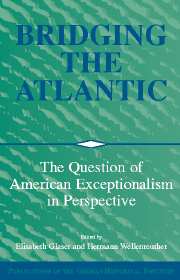Book contents
- Frontmatter
- Introduction
- Part One Transatlantic Faiths and Beliefs
- Part Two Transatlanatic Ideologies and the Perception of the Other
- Part Three People in the Transatlantic World The Perception fo Self
- Part Four Transatlantic Politics and Economics
- Part Five Transatlantic History and American Exceptionalism
- Index
Introduction
Published online by Cambridge University Press: 05 January 2013
- Frontmatter
- Introduction
- Part One Transatlantic Faiths and Beliefs
- Part Two Transatlanatic Ideologies and the Perception of the Other
- Part Three People in the Transatlantic World The Perception fo Self
- Part Four Transatlantic Politics and Economics
- Part Five Transatlantic History and American Exceptionalism
- Index
Summary
This book presents the revised results of a conference convened to discuss the work of the late Erich Angermann (1927-92). The symposium took place at the German Historical Institute (GHI) in Washington, D.C., from June 8 to 10, 1995. We remember Angermann, the senior historian of America in Germany, as the principal figure behind the foundation of the GHI in 1987. He also served as the first chairman of its academic advisory council. During his tenure as professor for American and European history at the University of Cologne, Angermann more than anyone else worked for a revitalization of what he called “Atlantic history.” That conceptual approach, derived from the eighteenth- and nineteenth-century tradition of humanistic historiography, viewed American history as part of an integrated history of North America and Europe. Thus, the concept of Atlantic history comprises the common links between European and American history since the beginning of the European settlement of North America as well as comparative social, cultural, and economic developments on both continents.
Angermann's integrated vision of a common Atlantic history of Europe and America remains important for American as well as European historians. During the last decade the historical communities on both sides of the Atlantic have vigorously debated the notion of complementary and comparable historical developments - or of Atlantic history.
- Type
- Chapter
- Information
- Bridging the AtlanticThe Question of American Exceptionalism in Perspective, pp. 1 - 8Publisher: Cambridge University PressPrint publication year: 2002



